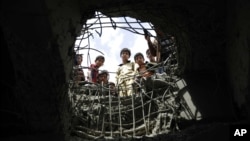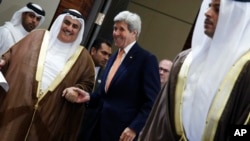Bombs used in a Saudi-led coalition airstrike on a Yemeni market that killed at least 100 people on March 15 were supplied by the United States, according to a report released by Human Rights Watch on Thursday.
The death toll includes 25 children, according to the rights group. Forty-seven people were also injured in the airstrike, making it the deadliest yet in the year-long war in Yemen, “illustrating tragically why countries should stop selling arms to Saudi Arabia,” said Priyanka Motaparthy, emergencies researcher at Human Rights Watch.
Investigators from the human rights group traveled to the site of the strike in the Hajja province, currently under Shi'ite rebel (Houthi) control. Bomb remnants found are said to be fragments of a GBU-31 satellite-guided bomb consisting of U.S. supplied parts. These results are consistent with findings of British news channel ITV during an investigation it conducted on March 26.
Kerry declines to comment
The release of the report coincides with a visit by U.S. Secretary of State John Kerry to Bahrain. Kerry declined to comment on the situation, saying, “I don’t have any solid information, any documentation with respect to what weapon might have been used.”
Although Saudi officials say the majority of casualties in this strike were Houthi rebels, Human Rights Watch said the attack caused “disproportionate loss of civilian life, in violation of the laws of war.
Such unlawful attacks when carried out deliberately or recklessly are war crimes,” the rights group said.
Human Rights Watch has also indicated that if the U.S., Britain and France continue supplying weapons to a non-compliant Saudi Arabia, they may be held responsible as being complicit in the unlawful airstrikes.
Multiple human rights groups have criticized the Saudi-led coalition in Yemen.
The United Nations says 60 percent of the 3,200 civilian deaths during this conflict have been the result of airstrikes which have hit markets, clinics and hospitals.
The Iran-backed Houthi rebels seized Yemen’s capital, Sana'a, in September 2014, and the war that followed has left 80 percent of the country in dire need of food, leaving it the poorest nation in the Arab world, according to the U.N.





